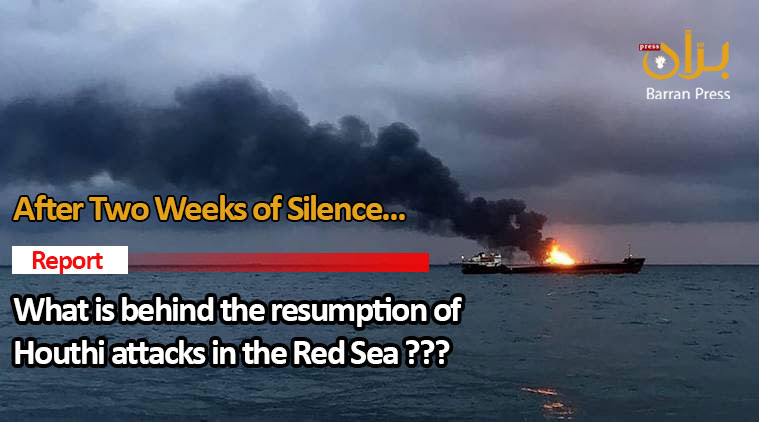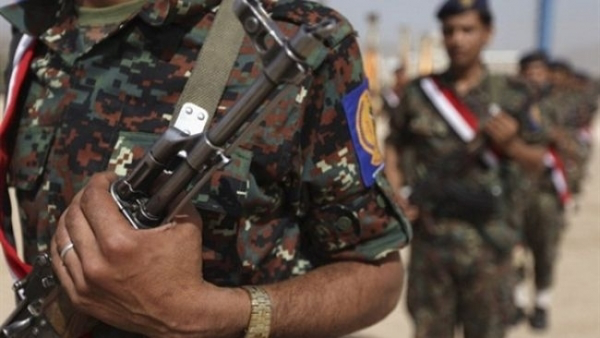
Barran Press
Two weeks after a lull in their attacks on commercial vessels in the Red Sea and Gulf of Aden, the Houthi group, internationally designated as a terrorist organization, has resumed its offensive. The group’s attacks, which began last November, had ceased following an Israeli airstrike on the port of Hodeida, under Houthi control, on July 20th.
The Israeli strike, which caused significant human and material damage to fuel storage facilities, the power plant, and other vital infrastructure, prompted threats of retaliation from the Houthis. However, despite the Israeli attack and ongoing US-British strikes on Houthi positions, the group had remained quiet.
Last Sunday, August 4th, the Houthis announced their targeting of a commercial vessel in the Gulf of Aden, marking their first attack in two weeks. This came just hours after the US Central Command (CENTCOM) announced on Saturday, August 3rd, that it had destroyed a Houthi missile and launcher within 24 hours.
On Wednesday, the Iranian-backed group claimed to have targeted two US destroyers and a commercial cargo ship in the Red Sea.
A Familiar Tactic
Some had interpreted the initial cessation of Houthi attacks as a response to UN-led peace efforts in Yemen, which have been pushing for a roadmap with Saudi Arabia and Oman playing key roles.
Barran Press posed questions to several researchers and politicians to explore the reasons behind the renewed Houthi attacks. They were asked whether the attacks were related to the stalled roadmap or whether they represented an escalation by Iran in response to the assassination of Houthi and Hezbollah leaders, followed by the assassination of the head of Hamas in Tehran.
Ibrahim Jalal, a non-resident scholar at the Middle East Institute in Washington, stated that “this is not the first time the Houthis have tactically stopped their attacks on international shipping lanes.”
Jalal, in an interview with Barran Press, expressed no surprise at the resumption of Houthi attacks, citing “the alleged justifications and the inflamed regional circumstances, not to mention the truce talks where they can achieve greater gains.”
An Iranian Decision
Hussain Al-Sufi, head of the Bilad Center for Studies, stated that “since the Houthis began their attacks, they have not claimed responsibility for them. It was the Americans who attributed them to the Houthis, and then the videos started coming out, which means it is not a purely Houthi stance, not a Houthi decision, not a Houthi weapon. In other words, this is an organic faction that follows the leadership of the Iranian Revolutionary Guard Corps.”
Al-Sufi, in an interview with Barran Press, explained that “the cessation and resumption of operations are decided by Tehran. There is a decision-maker and controller, and from there orders are issued for execution or cessation.”
He added that “Iran has escaped blame after the ‘Aqsa Flood’ and shifted attention to the noisier arena to divert attention from the criticism of Hezbollah and itself.”
Al-Sufi asserts that Iran is doing this now and “whenever it feels it needs to carry out operations, it deflects the pressure it is trying to present itself as the sole owner of the ‘Aqsa Flood,’ then it escapes to its tools in Yemen.”
In his opinion, “Iran’s operations are not a defense of the victims in Gaza, but rather the implementation of agendas to impose its regional project and seek to establish rules of engagement in the region, even at the expense of the Palestinian cause or on the ruins of Arab peoples.”
A "Presence Recording" or a Shift in Strategy?
Military analyst and expert Brigadier General Abdulrahman Al-Rubaie believes the initial pause in Houthi attacks was a direct consequence of the Israeli strike on Hodeidah, which he claims inflicted significant damage to their oil and gas reserves.
He questioned the authenticity of the resumed attacks, stating in an interview with "Barran Press": "If these attacks happened today, as no official external sources have confirmed them, it's merely a 'presence recording' because they're starting to feel public opinion is becoming restless, especially after the Israeli strike."
Al-Rubaie believes the Houthis are either "afraid" or have been "forced" to refrain from targeting ships in the Red Sea. He sees the recent attacks, if confirmed, as a way to "record their presence" and appease public opinion, which may have become critical of their silence.
No Roadmap for Peace
Al-Rubaie downplayed the impact of these operations on the roadmap for ending the war in Yemen, stating that "the roadmap is not a ready-made, agreed-upon document." He clarified that "the roadmap is just a set of ideas that will be negotiated."
He added: "There is no agreement on the roadmap yet, and it doesn't mean that its clauses and details have been agreed upon."
He continued: "As long as the roadmap is still an idea, and this idea is still being shaped and negotiated, there is no connection between it and what is happening in the Red Sea, whether it is ready and agreed upon or still being conceptualized."
Attacks Without Purpose
Since November 2023, the Houthi group has launched missile and drone attacks against commercial ships in the Red Sea, the Arabian Sea, and the Gulf of Aden off the coast of Yemen, claiming they are in support of Gaza, which is facing an Israeli offensive.
The group's attacks have led to increased maritime insurance costs and prompted many international shipping companies to opt for the much longer route around the southern tip of Africa.
For two weeks following the Israeli attack on Hodeidah on July 20th, no attacks were recorded by the Houthi group, which is internationally designated as a terrorist organization and supported by Iran.
To deter the Houthis, the "Guardian of Prosperity" coalition, led by the United States and with significant British participation, launched airstrikes on Houthi positions in Yemen in January 2024. The Houthis, in turn, expanded their operations to include ships linked to Washington and London.
Since January 12th, the US and UK have conducted approximately 560 airstrikes against the Houthis, resulting in the deaths of 58 and injuries to 86, according to the group's own admission.
The internationally recognized Yemeni government maintains that Western airstrikes are ineffective in neutralizing the Houthi threat to navigation and that the most effective solution is to support its armed forces in reclaiming Hodeidah, its ports, and other areas under Houthi control.





